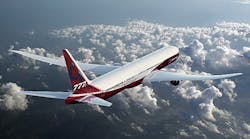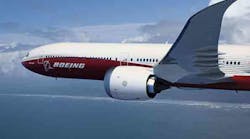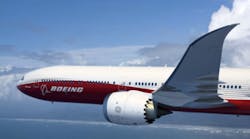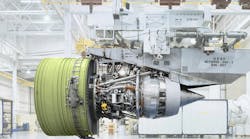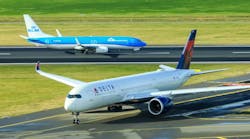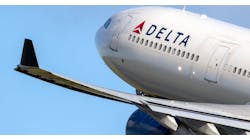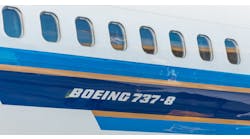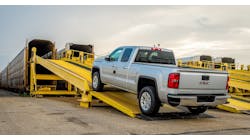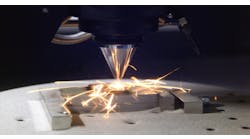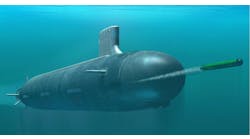Boeing Commercial Airplanes has completed a deal with several Japanese manufacturers to supply a significant portion of the structural components for the 777X aircraft, a revamped version of its long-range, twin-engine passenger jet to be introduced in 2020. The design includes some elements developed for the 787 Dreamliner, including composite wings and the GE9X high-bypass turbofan engines.
The jet builder reportedly has 306 firm orders for the new jets, which will enter into production in 2017.
Boeing, with Japan Aircraft Industries (JAI), and Japan Aircraft Development Corporation, initiated a "memorandum of understanding” last year that anticipated JAI would provide up to 21% of the major structural components for the two versions of the 777X.
JAI is a consortium of Mitsubishi Heavy Industries, Kawasaki Heavy Industries, Fuji Heavy Industries, ShinMaywa Industries, and NIPPI Corporation. JADC is a trade association that coordinates joint commercial and technological programs involving the Japanese aircraft industry.
“The JAI companies are investing in new facilities and introducing robotic and other automated systems to ensure they deliver high-quality products on time, every time,” according to Shigeru Murayama, JADC chairman and president of KHI. “This is a measure of their commitment to the success of the 777X.”
The finalized agreement indicates that the Japanese manufacturers will supply fuselage sections; center wing sections; pressure bulkheads; main landing gear wells; passenger, cargo and main landing gear doors; wing components; and wing-body fairings.
Boeing noted it has partnered with Japanese aerospace suppliers for nearly 50 years, to develop and manufacture the most of its commercial aircraft series. It added that in 2014 it purchased over $5 billion of goods and services in Japan. It said it expects its Japanese purchases to total approximately $36 billion between 2014 and the end of the decade.
“Our Japanese industry partners have consistently performed to the highest standards and contributed enormously to the resounding success of the current 777,” according Boeing’s Kent Fisher, vice president and general manager, Supplier Management. “In working with us on the affordability goals of the 777X, they have modeled the kind of partnership and commitment needed to serve our customers and the changing demands of the marketplace.”
